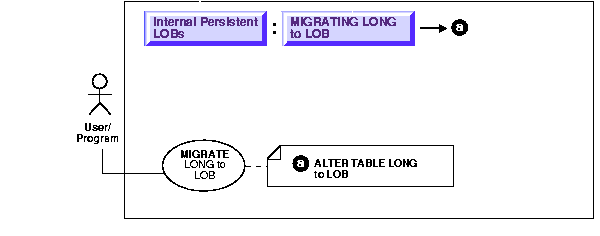Release 1 (9.0.1)
Part Number A88879-01
Home |
Book List |
Contents |
Index | Master Index | Feedback |
| Oracle9i Application Developer's Guide - Large Objects (LOBs) Release 1 (9.0.1) Part Number A88879-01 |
|
Internal Persistent LOBs, 15 of 43

|
See:
"Use Case Model: Internal Persistent LOBs Operations", for all Internal Persistent LOB operations. |
This procedure describes how to migrate LONGs to LOBs using the (new) LONG-to-LOB API.
|
See Also:
Chapter 8, "Migrating From LONGs to LOBs" for further details on using the LONG-to-LOB API. |
Use the following syntax reference:
The fields used in the following example are:
CREATE TABLE Multimedia_tab ( Clip_ID NUMBER NOT NULL, Story CLOB default EMPTY_CLOB(), FLSub NCLOB default EMPTY_CLOB(), Photo BFILE default NULL, Frame BLOB default EMPTY_BLOB(), Sound BLOB default EMPTY_BLOB(), Voiced_ref REF Voiced_typ, InSeg_ntab InSeg_tab, Music BFILE default NULL, Map_obj Map_typ ) NESTED TABLE InSeg_ntab STORE AS InSeg_nestedtab;
Suppose the column, STORY,of table MULTIMEDIA_TAB was of type LONG before, that is, you originally created the table MULTIMEDIA_TAB as follows:
CREATE TABLE MULTIMEDIA_TAB (CLIP_ID NUMBER, STORY LONG, .... );
To convert the LONG column to CLOB just use ALTER TABLE as follows:
ALTER TABLE multimedia_tab MODIFY ( story CLOB );
and you are done!
Any existing application using table MULTIMEDIA_TAB can continue to work with minor modification even after the column STORY has been modified to type CLOB. Chapter 8, "Migrating From LONGs to LOBs" provides examples of operations (binds and defines) used by LONGs and that continue to work for LOBs with minor modifications.
The following example illustrates how to use the LONG-to-LOB API with OCI:
The following example illustrates converting from LONG to LOBs when using a >4K bind and simple INSERT:
word buflen, buf1 = 0; text buf2[5000]; text *insstmt = (text *) "INSERT INTO MULTIMEDIA_TAB(CLIP_ID, STORY) VALUES (:CLIP_ID, :STORY)"; if (OCIStmtPrepare(stmthp, errhp, insstmt, (ub4)strlen((char *)insstmt), (ub4) OCI_NTV_SYNTAX, (ub4) OCI_DEFAULT)) { DISCARD printf("FAILED: OCIStmtPrepare()\n"); report_error(errhp); return; } if (OCIBindByName(stmthp, &bndhp[0], errhp, (text *) ":CLIP_ID", (sb4) strlen((char *) ":CLIP_ID"), (dvoid *) &buf1, (sb4) sizeof(buf1), SQLT_INT, (dvoid *) 0, (ub2 *) 0, (ub2 *) 0, (ub4) 0, (ub4 *) 0, (ub4) OCI_DEFAULT) || OCIBindByName(stmthp, &bndhp[1], errhp, (text *) ":STORY", (sb4) strlen((char *) ":STORY"), (dvoid *) buf2, (sb4) sizeof(buf2), SQLT_CHR, (dvoid *) 0, (ub2 *) 0, (ub2 *) 0, (ub4) 0, (ub4 *) 0, (ub4) OCI_DEFAULT)) { DISCARD printf("FAILED: OCIBindByName()\n"); report_error(errhp); return; } buf1 = 101; memset((void *)buf2, (int)'A', (size_t)5000); if (OCIStmtExecute(svchp, stmthp, errhp, (ub4) 1, (ub4) 0, (const OCISnapshot*) 0, (OCISnapshot*) 0, (ub4) OCI_DEFAULT)) { DISCARD printf("FAILED: OCIStmtExecute()\n"); report_error(errhp); return; }
|
|
 Copyright © 1996-2001, Oracle Corporation. All Rights Reserved. |
|